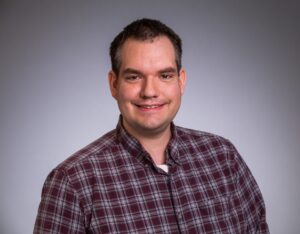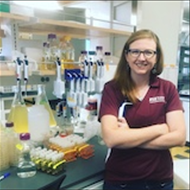Microbiologists collaborate on new interdisciplinary research program
By: Dr. Andy Flick, scientific coordinator Evolutionary Studies Initiative
Big surprises can come from the smallest packages, for example, microbes. Assistant professors Drs. Megan Behringer and Benjamin Bratton have formed a collaboration to study the evolution of E. coli – funded by a pilot grant from the Evolutionary Studies Initiative (ESI).
The pair use a technique called single-cell phenotyping, which allows for a greater understanding of micro-habitats. For instance, E. coli cells in environments with slightly different pH concentrations can show a range of responses (phenotype) – even though they are genetically identical (genotype).

Behringer noted, “I was trying to measure intercellular pH; I’ve found papers that said I can. However, when I started measuring intercellular pH, it became apparent that I was actually measuring extracellular pH. It turned out the dye was leaking at relatively high pH concentrations.”
Behringer then reached out to Bratton, who had experience studying these kinds of dyes. Bratton studies single cell responses and measuring fitness and physiology of single bacterial cells, instead of whole populations.

One benefit of studying evolution in bacteria is the speed at which it happens. According to Bratton, “bacteria grow so fast they are a great place to look at evolution because you have clonal populations that can vary on a reasonable timescale.”
Behringer continued, “People think of Drosophila (fruit flies) as evolving quickly, but you’re not going to leave the lab and come back in three hours and see any real changes. In bacteria, the entire population can change greatly in that amount of time.”
This collaboration comes at an important time for the two new faculty members. One extra hurdle in the time of a pandemic is getting to know a department primarily working from home and so finding a sense of community is more important than ever.
“As I started out, the junior faculty have been lifelines because they had to be on campus and they have to be engaged,” said Behringer. She continued, “as we’re seeing the next set of faculty starting now, we don’t want them to feel as alone as we felt when we first started.”
The project also includes earlier career researchers like new postdoctoral scientist Dr. Sarah Worthan and undergraduate scientist Aaron Yeh.
Worthan, in the Behringer lab, will bring a physiology background along with CRISPR skills to this collaboration. “She will be able to create designer mutants and think about where in the physiology space this sits and what type of phenotypes we should be thinking about,” said Behringer.
Yeh is excited to get research lab experience working with Bratton. According to Bratton, “this will be a great way for him to see what he likes about lab work. He’s undecided about his future career between being an infectious disease pediatrician and a basic science researcher. I loved getting lab experience early on and that’s something that’s been difficult for undergraduates during the pandemic.”
The two researchers are eager to see how microbes evolve beyond persistence to eventually thrive in resource-limited environments.
